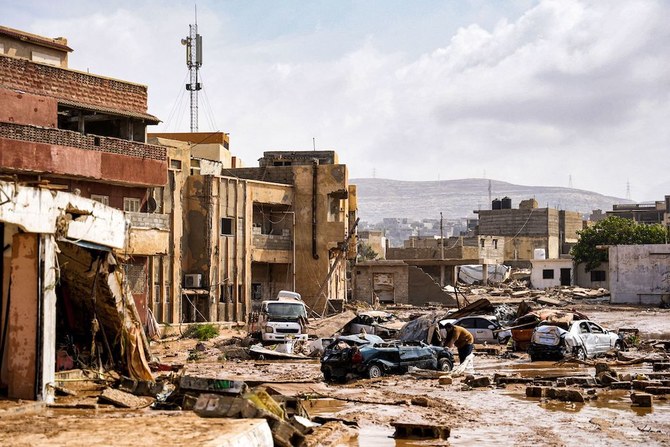JEDDAH: The Arab world rushed on Tuesday to offer aid and support to the victims of natural disasters in Libya and Morocco.
In eastern Libya, more than 2,000 people died and at least 10,000 were missing after Storm Daniel caused devastating floods, mainly through the city of Derna.
In Morocco, nearly 3,000 people died after a 6.8-magnitude earthquake struck late on Friday near the High Atlas mountains 72 kilometers southwest of Marrakech, flattening whole villages.
Offers of assistance came from Saudi Arabia, the UAE, Egypt, Algeria, Jordan, Iraq, Kuwait, Tunisia and Turkiye.
The Kingdom on Tuesday expressed grief and solidarity with “Libya and its brotherly people, and the victims of the floods.” King Salman and Crown Prince Mohammed bin Salman earlier ordered aid flights to Morocco, and the crown prince called King Mohammed to affirm the Kingdom’s solidarity with Morocco and its people.
President Abdel Fattah El-Sisi declared a three-day mourning period in Egypt, and directed armed forces personnel to provide humanitarian aid, including relief teams, rescue equipment and shelter camps for Libya and Morocco.
The president of the UAE, Sheikh Mohammed bin Zayed Al-Nahyan, ordered the dispatch of urgent relief aid and search and rescue teams to Libya.
King Abdullah of Jordan ordered assistance to Libya, and said his country stood “in solidarity with Libya during these tragic circumstances.”
Tunisian prime minister Ahmed Hachani called Abdul Hamid Al-Dabaiba, head of the Libyan Government of National Accord, to express his “sincere condolences to the brotherly Libyan people.”
Massive destruction shattered the Mediterranean coastal city of Derna, where buildings on the river banks collapsed and houses and cars vanished in the raging waters. One UN official described it as “a calamity of epic proportions.”
Emergency services reported an initial death toll of more than 2,300 in Derna alone, with 7,000 injured and 10,000 people still missing.
“The situation in Derna is shocking,” said Osama Ali of the Rescue and Emergency Service in Tripoli. “We need more support to save lives because there are people still under the rubble and every minute counts.”
In Morocco, survivors of Morocco’s earthquake struggled in makeshift shelters on Tuesday after a fourth night in the open. Rescuers from Spain, Britain and Qatar were helping Morocco's search teams, while Italy, Belgium, France and Germany said their offers of assistance had yet to be approved.
The situation was most desperate for people in remote areas cut off by landslides that blocked access roads. Mehdi Ait Bouyali, 24, said his group of survivors had received food and blankets from people driving by, but nothing from the state. “The villages of the valley have been forgotten. We need any kind of help. We need tents,” he said.




























